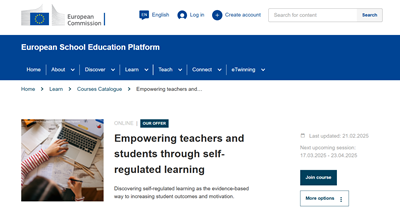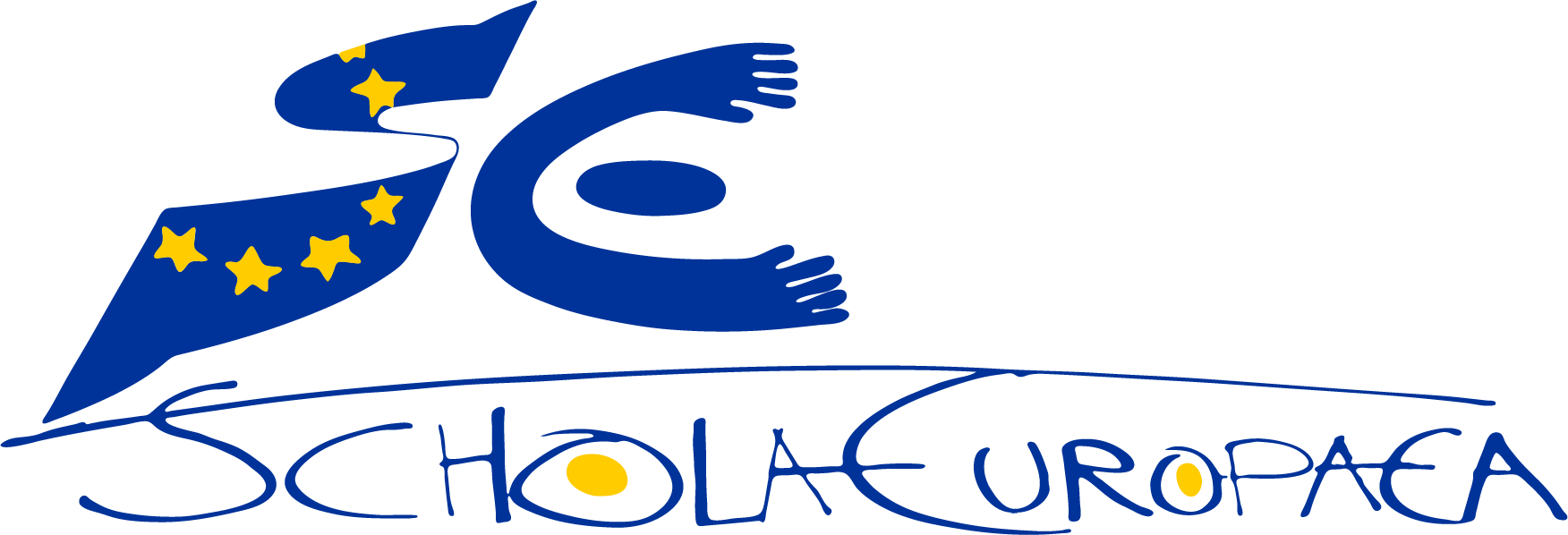Blog entry by OSG PEDA DC TEAM

European School Education Platform Professional Development Opportunities
Upcoming courses:
-
Empowering teachers and students through self-regulated learning
Discovering self-regulated learning as the evidence-based way to increasing student outcomes and motivation.
What if the secret to improving student learning isn’t about doing more, but doing things differently?
Students spend more than 10,000 hours in school, yet many struggle with knowing how to learn effectively. Teachers, of course, already support their students in countless ways. But when another international report drops with news of declining student performance, it’s hard not to feel the weight of it.
But what if there’s a proven solution that’s been hiding in plain sight?
Enter self-regulated learning (SRL)—a concept that’s backed by over 40 years of research but still underutilized in classrooms. And the best part? Boosting your students’ academic performance and motivation might not require big, time-consuming interventions after all.
📅 When? March 17, 2025
📍 Where? Online
This course builds upon the success of the 2022 course “Teaching Life Competences 1 – Shaping Lifelong Learners through Self-Regulated Learning”.
-
Strengthening literacy with eTwinning
In today’s rapidly evolving educational landscape, students need strong literacy skills to tackle future challenges. Literacy goes beyond reading and writing— it encompasses the ability to critically engage with diverse texts, communicate effectively across different modes, and navigate an increasingly digital world.
📅 When? March 31, 2025
📍 Where? Online
This course provides educators with practical strategies to integrate reading, writing, speaking, and digital literacy into eTwinning projects. You will examine the concept of literacy from multiple perspectives and explore how eTwinning projects can be a powerful tool to develop students’ literacy skills. Additionally, you will gain strategies for integrating digital tools to support literacy development, while engaging in project-based learning that enhances student engagement, collaboration, and critical thinking. Through hands-on activities, real eTwinning examples, and interactive tools, you will learn how to create collaborative international projects on literacy that foster meaningful learning experiences.
-
Supporting children’s numeracy: the role of the home learning environment
Children acquire many academically and non-academically relevant skills within the framework of the home learning environment, which is why this context plays a crucial role in the early and later development of children's competencies, including in the field of mathematics.
📅 When? March 31, 2025
📍 Where? Online
Therefore, teachers and educators should be aware of how parents can effectively support their children's mathematical learning and how they can collaborate successfully in this context. This includes topics such as the interaction between home and school, learning difficulties in mathematics, the usage of learning apps, and the homework situation.
This course on children's mathematical learning in the home learning environment not only provides a comprehensive overview of important and relevant aspects of the early and later home mathematics environment children experience, but also offers concrete ideas for fostering a successful partnership between professionals and parents to support children’s learning.
Upcoming webinars:
-
European Commission webinar: Engaging maths education through games, technology and interdisciplinary learning
How can we make mathematics more engaging and accessible for students? The M@THGAN project re-imagined math education by integrating games, technology, and real-world connections to create interactive and enjoyable learning experiences.
📅 When? March 24, 2025
📍 Where? Online
![]() Guest expert? Iohana Cristina Udrescu is a dedicated educator and project coordinator, passionate about transforming mathematics education through innovative methods. As Project Manager of Asociația Edulifelong, she has led multiple Erasmus+ projects focusing on integrating technology, game-based learning, and interdisciplinary approaches into teaching. With almost 20 years of experience in mathematics education and 10 years in teacher training, she has mastered the skill of designing engaging learning environments that foster problem-solving and creativity. She is an EU Climate Pact Ambassador, a Scientix Ambassador, and an advocate for sustainable and interdisciplinary education. Iohana collaborates with international organisations to develop hands-on learning experiences that bridge the gap between theory and practice, ensuring that mathematics becomes an exciting and relevant subject for students.
Guest expert? Iohana Cristina Udrescu is a dedicated educator and project coordinator, passionate about transforming mathematics education through innovative methods. As Project Manager of Asociația Edulifelong, she has led multiple Erasmus+ projects focusing on integrating technology, game-based learning, and interdisciplinary approaches into teaching. With almost 20 years of experience in mathematics education and 10 years in teacher training, she has mastered the skill of designing engaging learning environments that foster problem-solving and creativity. She is an EU Climate Pact Ambassador, a Scientix Ambassador, and an advocate for sustainable and interdisciplinary education. Iohana collaborates with international organisations to develop hands-on learning experiences that bridge the gap between theory and practice, ensuring that mathematics becomes an exciting and relevant subject for students.
This webinar will introduce practical strategies and resources, including the developed Game, a collection of Classroom Activities, and an online MOOC for teachers. In the webinar, innovative approaches that help students develop confidence, problem-solving skills, and a deeper appreciation for mathematics, will be shared.
-
European Commission webinar: Introducing numeracy in ECEC with STEAM songs and storytelling
Join us for an engaging webinar where we explore how storytelling, songs, and nursery rhymes can be powerful STEAM (STEM & the Arts) activities to enhance early numeracy in ECEC. Discover creative, play-based strategies that integrate rhythm, patterns, sequencing, and problem-solving to foster mathematical thinking in young children, making learning both meaningful and fun.
📅 When? March 27, 2025
📍 Where? Online
![]() Guest expert? Paula Walshe is an experienced lecturer, researcher and published author in the field of Early Childhood Education. She is currently lecturing at South East Technological University in Carlow, Ireland while also completing her PhD research on STEAM in Early Childhood Education at Dundalk Institute of Technology. Paula has recently published two books based on areas of ECEC practice: "Full STEAM Ahead - Science, Technology, Engineering, ehe Arts and Maths in Early Childhood Education" and "Síolta in Practice" a book on implementing quality standards in ECEC. Both books are available from www.borupress.ie
Guest expert? Paula Walshe is an experienced lecturer, researcher and published author in the field of Early Childhood Education. She is currently lecturing at South East Technological University in Carlow, Ireland while also completing her PhD research on STEAM in Early Childhood Education at Dundalk Institute of Technology. Paula has recently published two books based on areas of ECEC practice: "Full STEAM Ahead - Science, Technology, Engineering, ehe Arts and Maths in Early Childhood Education" and "Síolta in Practice" a book on implementing quality standards in ECEC. Both books are available from www.borupress.ie
In this webinar we will explore how storytelling, songs, and nursery rhymes can serve as powerful STEAM (STEM & the Arts) activities to support early numeracy in ECEC. Through rhythm, patterns, sequencing, and problem-solving, these creative, play-based approaches help young children develop mathematical thinking in an engaging and meaningful way. Gain practical insights and ideas to enrich early learning! We will also discuss how these activities foster language development and social-emotional skills, creating a holistic learning experience. Join us to discover fun, research-based strategies that make numeracy accessible and enjoyable for young learners!
Webinar recordings:
-
The Socratic method in schools: Midwife, sometimes gadfly
This webinar will explain its core elements and how they may be adapted to scaffold group discussions. In its myriad adaptations to different contexts, we will see that often it is more appropriate to speak of Socratic methods.
📅 When? ENDED February 26, 2025
📍 Where? Online
![]() Guest expert? Erick Wilberding completed a Ph.D. in the History of Art at New York University. For nearly 30 years, he has taught at Marymount International School in Rome, where he is the head of the Philosophy and Theory of Knowledge Department. He has published Teach like Socrates (Routledge, 2014) and Socratic Methods (Routledge, 2019). In 2021 he wrote the TED-Ed animation about the Socratic Method. This tool will help improve your critical thinking, which has over 6.5 million views. He is greatly convinced of the value of making thinking visible through dialogic teaching.
Guest expert? Erick Wilberding completed a Ph.D. in the History of Art at New York University. For nearly 30 years, he has taught at Marymount International School in Rome, where he is the head of the Philosophy and Theory of Knowledge Department. He has published Teach like Socrates (Routledge, 2014) and Socratic Methods (Routledge, 2019). In 2021 he wrote the TED-Ed animation about the Socratic Method. This tool will help improve your critical thinking, which has over 6.5 million views. He is greatly convinced of the value of making thinking visible through dialogic teaching.
The Socratic Method is one of the most versatile tools for teachers in the classroom, moving the crucial activities of analysis and judgment to the students. This webinar will explain its core elements and how they may be adapted to scaffold group discussions. In its myriad adaptations to different contexts, we will see that often it is more appropriate to speak of Socratic methods.
